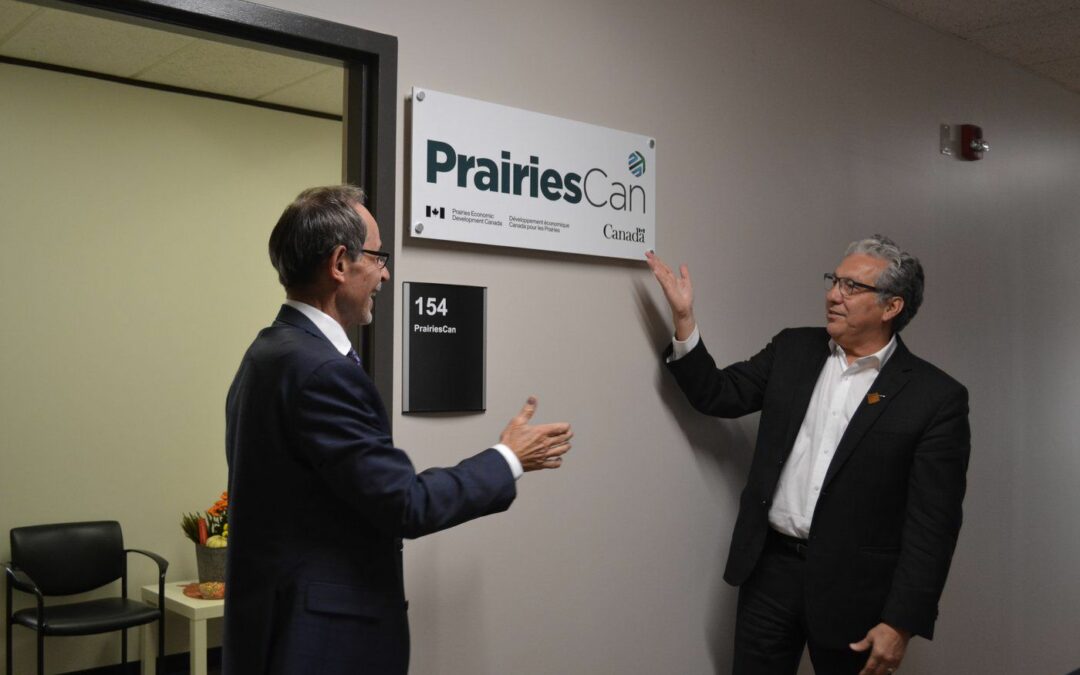The Province of Saskatchewan has unveiled a new PrairiesCan service office in Prince Albert that will be focused on supporting an enhanced, community-based approach to economic development for northern communities.
Dan Vandal, the federal minister responsible for Prairies Economic Development Canada and the Canadian Northern Economic Development Agency, announced Friday that seven new regional PrairiesCan offices have opened across the prairies, including the one located inside the Sask. Polytech Prince Albert campus. As part of the grand opening, $1,755,000 in federal funding will be provided for two projects that support community renewal in Prince Albert and improve access to northern Saskatchewan communities.
The City of Prince Albert received $142,500 through the Canada Community Revitalization Fund to improve the accessibility of Little Red River Park. Another $1,612,500 was provided to the Transwest Air Limited and West Wind Aviation Partnership (operating collectively as Rise Air) through the Regional Air Transportation Initiative to increase air service to keep Saskatchewan’s northern and Indigenous communities connected.
Rise Air is a charter airline that operates out of seven bases, including one in Prince Albert, that supports people living, working, and investing in Saskatchewan’s north by providing safe and reliable air connections. Dan Gold, the Director of Communications and Stakeholder Relations for Rise Air, welcomed the new funding announcement.
“Rise Air is proudly owned by First Nations communities and the First Nations communities that we serve. This interest-free financing provided by the Regional Air Transportation Initiative has been truly crucial in helping us restore the levels of service to our communities in the north,” he explained. “From the reintroduction of the Sunday services to additional flights, we can once again provide flexibility to the community members to get them where they need to be.”
The funding will be provided over a five-year period. It will go directly into refurbishment of equipment, replacement of equipment, reliability and sustainability of services, said Gold. The funds will also get Rise Air one step closer to expanding the service to other northern communities and spreading brand-new roots. Currently, the furthest north that Rise Air goes is Uranium City.
Vandal said he has heard from community locals that having a PrairiesCan office in Prince Albert will help create opportunities for the provincial government to work closely with northern residents. When PrairiesCan was launched last year, it was with the goal of focusing on the economic reality of the north, making smart investments to accelerate growth, create jobs, and reach more communities.
“The north is a special place full of immense natural beauty, a bundle of resources, and rich Indigenous culture and tradition. It has robust agriculture, forestry, mining, and tourism industries. This region is a key contributor to Saskatchewan’s economy, and it provides endless opportunities for growth and economic prosperity,” said Vandal. “But it is also an area with unique challenges that requires local knowhow and community-based solutions to ensure people here thrive.”
Vandal said PrairiesCan does information sharing amongst business networks, convene regional meetings, pathfinding for organizations or requests that may need help from other federal departments, as well as provide funding to businesses or initiatives that apply.
“Today’s opening and announcement marks a new chapter for PrairiesCan to support and to provide Northern Saskatchewan with further opportunities for economic growth and prosperity,” reads a news release from the provincial government.
The seven new service locations are in Lethbridge, Fort McMurray, Grand Prairie, Regina, Prince Albert, Brandon, and Thompson. The PrairiesCan headquarters is in Edmonton and the existing offices are in Saskatoon, Winnipeg, and Ottawa.
In 2021, Western Economic Diversification Canada was provided funding from the federal government to transition into two new Regional Development Agencies – PrairiesCan — serving the prairies and PacificCan — serving British Columbia. The new enhanced community-based approach addresses specific circumstances and needs of these regions and includes a range of local organizations from different sectors as active participants in economic development.
The new PrairiesCan office will have two members of staff and is located inside the Sask. Polytech Prince Albert campus at 1500 10th Avenue East in room 154.
(Top Photo: Dr. Larry Rosia, President and CEO of Saskatchewan Polytechnic and Honourable Dan Vandal, Minister of PrairieCan unveiling the new PrairieCan office inside the Prince Albert Campus of Sask. Polytech. — Bailey Sutherland/Daily Herald. Bailey Sutherland, Local Journalism Initiative Reporter)
